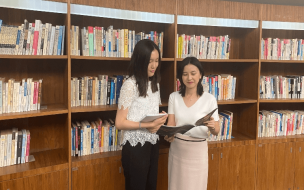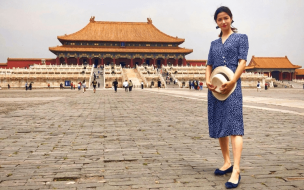On the outside, it was a typical house in American suburbia, with a front lawn and a white picket fence. After school, Joseph Roy would come home and play basketball in the driveway with his brother.
But within, Joseph’s home was different to the identical builds across the street. His mother was a first-generation immigrant from Singapore, and ethnically Chinese. She’d cook Chinese food and invite Chinese friends over for dinner.
And Joseph and his siblings studied hard. “School homework was a breeze compared to the extra work my mom would assign!” Joseph laughs.
From a non-traditional upbringing, Joseph took a non-traditional path. There were 3,000 students at his college; no more than 15 studied Chinese; still fewer packed their bags and jetted off to China to study there for a whole year.
Aged 19, Joseph did just that. Through learning Mandarin, he immersed himself in Chinese culture and opened his eyes to new career opportunities. Since completing his MBA, he’s helping others do the same.
Beef noodles
Joseph was born in Hawaii in 1992. His father, an American doctor, met his mother working in a military hospital there.
Growing up on the mainland—in Chico, a California college town 80 miles north of Sacramento— Joseph’s life revolved around education. He, his brother and his sister, would study music—the violin and the guitar—“day in, day out.” And professors from China and Hong Kong—from Chico’s
California State University—would make regular visits to the family home.
“We were always in contact with Chinese culture because of my mom,” Joseph explains. “Growing up in a house that fused East and West, I learned how to view the world from different perspectives.
“But my knowledge of China, the country, was basically zero. My mom would try to teach us Chinese but, as kids, we would revolt against the idea. I wasn’t aware of what was going on in China, politically or economically, until college.”
Joseph studied international relations at Hamilton College in New York. In freshman year, he took Spanish, but throughout his coursework China just kept popping up. In his second year, much to his mother’s amusement, he took the decision to study Chinese.
“By the third year, I was sold on it!” he says. Joseph would spend a whole college year abroad, learning Chinese at the Central University of Nationalities in Beijing—his first time alone in a foreign country.
“My first couple of weeks in China were a total blur,” Joseph recalls. “I remember it was so easy to get lost; there were so many people everywhere; the scale of everything was so huge. When I got to the university campus, there was so much commotion. People were coming in and out on electric scooters—it was very different to anything I’d ever experienced before.”
For his first month in China, Joseph ate the same thing every day. Beef noodles, he says, were the only thing he’d learned how to order in a restaurant before he arrived. At that stage, his language skills were basic. “Then, slowly, you figure out ways to use the limited language that you have, and you develop from there,” he explains. “By the end of the year, it almost seemed natural to live here.”
A career in China
Studying at a university designated for China’s ethnic minorities—there are 55 in total—Joseph was surprised to encounter Mongolians and Tibetans, as well as representatives of China’s Muslim population.
Just outside the university gates, a strip of different shops would close and reopen again week after week. A shop selling waffles would be replaced by a women’s clothes store; a bicycle shop replaced by a bar selling milk tea.
Captivated by the pace and complexity of life in China, Joseph decided to stay. He worked for two years for the Associated Colleges in China, running operations for an online Chinese language program, before an internship at a technology group commercializing Chinese inventions.
“At that time, I knew that China was the place where I wanted to build my career, but I wasn’t sure what the right next step was,” he says.
“I was looking at different MBA programs in China, and CKGSB seemed like the natural place to go. The school promotes itself as for Chinese entrepreneurs and Chinese business, and that’s what I wanted to get into.”
At age 24, Joseph joined CKGSB as one of the youngest students in the class. The constant group work meant he learned from both the professors and his more experienced classmates at the same time. “It was like having a second class outside of class,” he says.
The CKGSB network led to job opportunities, too. Joseph was approached by a CKGSB alum looking to teach foreigners more about life in China and, together, they settled on Chinese language as an entry point.
Since August 2017, he’s refocused his career, and is now part of an educational technology— edtech—startup team working to build a new system for teaching Chinese online, to kids all around the world.
“I would never have been able to meet this team without CKGSB,” Joseph says. “CKGSB is a platform for people to come together. As an MBA student, you’re instantly brought into the Chinese business world. You get an awareness of business in China that I’m doubtful you could get otherwise.
“At the beginning of the MBA, I didn’t really know what industry I wanted to work in,” he continues. “The work I’m doing now is closely related to what I was doing before. I’m just approaching it from a different perspective.”
Almost fluent
Joseph’s based in Beijing and plans to stay. Learning Chinese is a never-ending endeavor although Joseph’s almost fluent—the days of beef noodles are behind him.
He’s in the testing phase for his online classes—travelling back and forth between the US and China—exploring how new technologies can be used to build virtual classrooms and best promote cross-border language education globally.
“Learning Chinese is not just about learning a language. It's not just about being able to order something in a restaurant," he says. "It's something that can open your mind to different possibilities.
"We hope this will be a global thing. As China's economy gains more influence, we think that the language will follow."
RECAPTHA :
8e
dc
ef
bd









